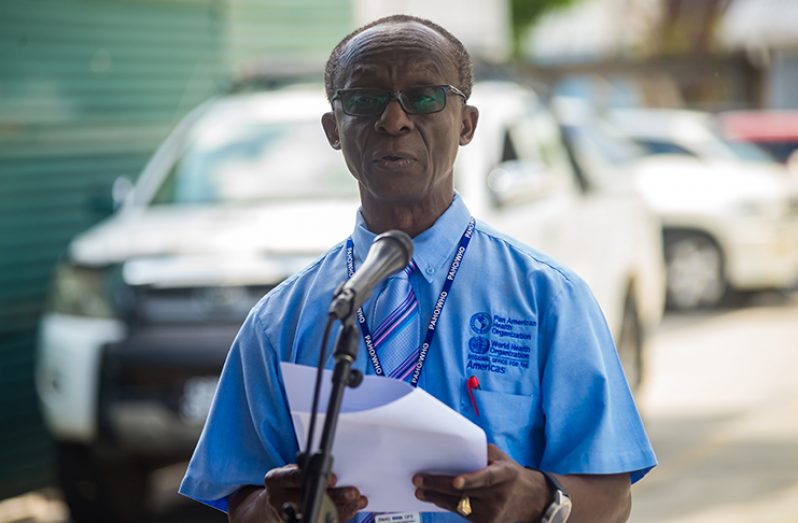–organisation ready to help private institutions with testing, treating persons
AS cases of the Novel Coronavirus (COVID-19) disease continue to increase locally, health authorities will soon have a welcome boost in their capacity to test for the disease, as the country is set to receive some 7,000 COVID-19 test kits from the Pan American Health Organisation/World Health Organisation (PAHO/WHO).
Guyana, which has so far recorded over 60 cases of COVID-19, has seen a “rapid” increase in the number of persons tested positive over the past week.
Although 220 of the 283 persons tested so far have had negative results, the issue remains a “serious” concern for health authorities here who are valiantly trying to contain the spread of the pandemic locally.
Despite the increase in the number of cases here in Guyana, PAHO/WHO’s Dr. William Adu-Krow says he does not see an immediate need for a review of the testing guidelines, as he believes that Guyana is well equipped to conduct those tests.
“We are not running out of test kits; we have over 2,000, and only over 200 have been used… And today, we are expecting about 7,000 more test kits,” Dr. Adu-Krow said during a virtual press briefing on Friday.
TESTING RATES
When asked about the rate of testing, he said that would tend to vary from country to country across the Caribbean, because there is an established criteria to determine the persons who are being tested.
And while there is nothing like an optimal testing rate, Dr. Adu-Krow said that Guyana’s is about 20-25 per cent, which is what obtains globally. This means that if 100 persons are tested, 25 per cent would be positive.
“If you open it up too wide, you would be testing a 1,000, and only get 20; so you will be wasting test kits… On the other hand, if you are too rigid, you will be testing 10, and eight are positive. But you will be missing a lot,” Dr. Adu-Krow said.
As things stand now, Guyana, according to WHO guidelines, is within range for testing, but according to Dr. Adu-Krow, if needs be, the range “could be widened a little more”.
There could, however, be a natural widening of the testing range, since private institutions were given the “green light” to test for COVID-19 and treat infected persons.
Initially, the National Reference Lab was the only institution which was authorised to conduct tests, but it was reported that private institutions are now authorised to test for COVID-19.
“We have given the ‘green-light’ for private hospitals to import testing kits, so they could supplement and do rapid testing,” said Head of the National COVID-19 Task Force, Prime Minister Moses Nagamootoo during a recent virtual press briefing.
With the new system in place, testing for the dreaded disease will be done by both State and private institutions in the near future.
PAHO has since expressed its willingness to assist private institutions in preparing themselves to test for the disease.
PAHO SUPPORT
The international health organisation has “brought in” an expert to train technicians at the reference lab to test for the COVID-19 disease.
“We are prepared to train other ‘labs’ and private hospitals to have the same quality assurance as the reference ‘lab’; they will have to go by the standards we have set up for the government,” said Dr. Adu-Krow.
He said that PAHO normally supports Guyana by supporting the public health ministry, and they will continue to do so by giving them testing kits and now by supporting private institutions, which will have to follow WHO guidelines.
On the issue of testing, Dr. Adu-Krow was asked to talk about “rapid testing”, and his response was that, about 40 rapid-test kits are available globally, but the WHO cannot endorse any particular rapid-test kit, unless it has gone through clinical trial and peer review to see if it has met the standards which the health organisation agreed to.
None of the rapid tests have so far met the established standards, in the sense that none of those kits are specific.
In explaining what he meant, Dr. Adu-Krow said: “If it (the rapid-test kit) says COVID-19-positive, it could be positive for SARS, MERS, the common flu, and even the cold; they are still undergoing tests, so we have recommended that governments await WHO’s approval of the kits. But it is up to the countries to decide if they will go for it.”
GLOBAL FIGURES
Globally, there are close to two million cases of COVID-19 and over 130,000 deaths. And, with no approved treatment or cure, there is no assurance that persons will survive after contracting the disease. In the absence of approved medication, governments and authorities across the world have employed a number of preventative measures to contain the spread of the disease.
According to the WHO, COVID-19 is an infectious disease caused by the newly discovered coronavirus. WHO said most people infected with the COVID-19 virus will experience mild to moderate respiratory illness and recover without requiring special treatment. Older persons and those with underlying medical problems such as cardiovascular disease, diabetes, chronic respiratory disease, and cancer, are more likely to develop serious illness.
The WHO believes that the best way to prevent and slow down transmission is to be well informed about the virus, the disease it causes and how it is spread.
“Protect yourself and others from infection by washing your hands or using an alcohol-based rub frequently and not touching your face. The COVID-19 virus is spread primarily through droplets of saliva or discharge from the nose when an infected person coughs or sneezes, so it’s important that you also practise respiratory etiquette (for example, by coughing into a flexed elbow),” the WHO has advised.



.jpg)








